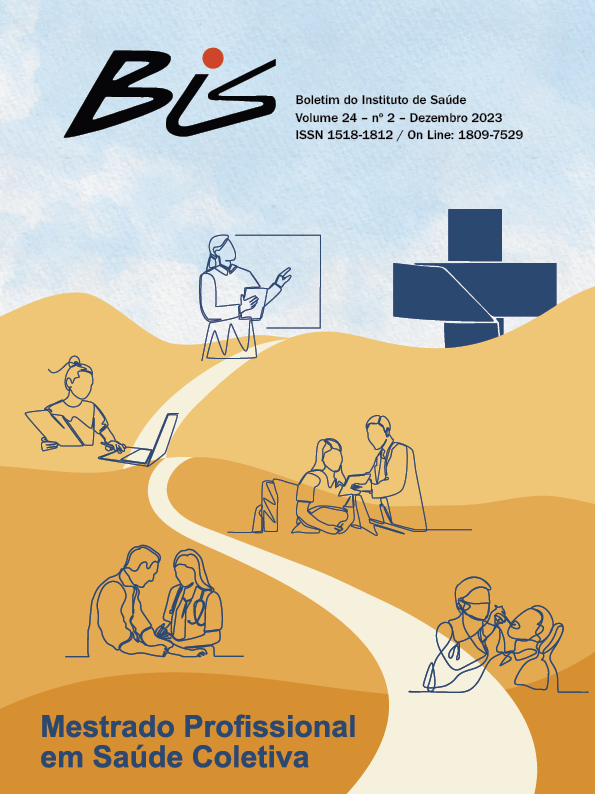Abstract
The study discusses the competencies involved in conducting the technique of conversation circles. It is an analytical and reflective account developed based on the experiences of students in the Health Promotion discipline of a Professional Master's program in Family Health in Mato Grosso do Sul, Brazil. The experiences were recorded in the form of experience reports and emphasized the use of conversation circles in Family Health Units. From the documentary corpus, the target audience, themes/ objectives, and four competencies applied for the development of conversation circles were identified: learning to know, learning to do, learning to live together, and learning to be. It was observed that the target audience and the themes developed in the conversation circles were related to the epidemiological situation of the territory. Furthermore, it was identified that the technique is often based on the theoretical framework of Paulo Freire, with systematic stages. The competencies of knowing and doing were challenging. The competencies of living together and being stood out positively in the described experiences. Finally, the experiences revealed that there are competencies that need to be improved for the facilitation of conversation circles to achieve their transformative potential.
References
Azevêdo AVS, Silva MA, Reis TCM. Promoção da saúde no contexto das redes sociais significativas. Nova perspect. sist. 2019;28(63):55–66.
Carvalho F, Akerman M, Cohen S. A dimensão da atenção à saúde na Promoção da Saúde: apontamentos sobre a aproximação com o cuidado. Saude soc. 2022;31:e210529pt.
Kessler M, Lima SBS, Weiller TH, Lopes LFD, Ferraz L, Eberhardt TD, et al. Longitudinalidade do cuidado na atenção primária: avaliação na perspectiva dos usuários. Acta paul enferm. 2019;32:186–93.
Raupp L, Conte M. Rodas de Redução de Danos RD: cadê você? BIS, Boletim do Instituto de Saúde. 2020;21(2):131–41.
Santos ELO, Kalckmann S, Borrego CCH, Sellinger NC, Imparato RR, Rosa TEC. Relato de experiência: travestis e transexuais em situação de rua e o processo de hormonioterapia pelo SUS. BIS, Bol. Inst. Saúde. 2021;22(1):111–7.
Pereira JJG, Neto JPB, Araújo LG, Coelho GC de A, Araújo JRV. Rodas de conversa educativas com gestantes no âmbito da atenção primária: um relato de experiência. Research, Societyand Development .2022;11(12):e101111234105–e101111234105.
Melgaço NPR, Mol LM, Couto CB, Heringer CA, Miranda MC, Duarte AC da S, et al. Promoção de hábitos saudáveis de vida para hipertensos usando grupos operativos, na atenção primária em saúde. Brazilian Journal of Development. 2021;7(3):24538–48.
Amorim LB, Santos MR, Santos JAM, Santos CP, Iochims FS, Ribeiro WA. A roda de conversa como instrumento de cuidado e promoção da saúde mental: percepção dos usuários dos CAPS. Nursing. 2020;23(263):3710–5.
Cruz LM, Coelho LA. Roda de conversa on-line: perspectivas e desafios da técnica. Momento - Diálogos em Educação. 2022;31(03):126–43.
Moura ABF, Lima MGSB. A reinvenção da roda: roda de conversa, um instrumento metodológico possível. Interfaces da educação. 2015;5(15):24–35.
Teixeira CP, Gomes MQ, organizadores. Mestrado Profissional em Saúde da Família. Turma Multiprofissional: manual do(a) mestrando(a). Recife: Fiocruz; 2022.
UNESCO – Organização das Nações Unidas para a Educação, a Ciência e a Cultura. Educação: um tesouro a descobrir [internet]. Brasília; 2010 [acesso em 10 jun 2022]. Disponível em: https://unesdoc.unesco.org/ark:/48223/pf0000109590_por13. Freire P. Pedagogia da autonomia: saberes necessários a prática pedagógica. São Paulo: Paz e Terra; 1996.
Freire P. Educação como prática da liberdade. São Paulo: Paz e Terra; 2002.
Sampaio J, Santos GC, Agostini M, Salvador ADS. Limites e potencialidades das rodas de conversa no cuidado em saúde: uma experiência com jovens no sertão pernambucano. Interface (Botucatu). 2014;18(suppl 2):1299–311.
Silva RP, Bertoldo TAT, Wartha EJ. Padrões discursivos em rodas de conversa como estratégia de ensino. Amazônia: Revista de Educação em Ciências e Matemáticas. 2021;17(39):108–28.
Damasceno RF, Silva PLN da. Competência cultural na atenção primária: algumas considerações. Journal of Management & Primary Health Care. 2018;9.

This work is licensed under a Creative Commons Attribution 4.0 International License.
Copyright (c) 2023 Inara Pereira da Cunha, Anna Cândida Barsante Moreno Ortega, Ana Cristina Atz dos Santos, Diego Silva de Castro, Edmundo Rondon Neto, Eliane Kelly Ribeiro da Silva, Jumara Espíndola dos Santos, Maria Bethânia Pereira Alves , Débora Dupas Gonçalves do Nascimento, Sandra Maria do Valle Leone de Oliveira
